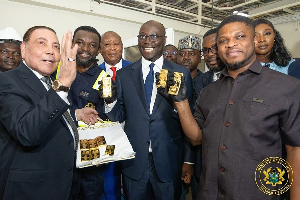He was in Parliament for quite a while, so it is not clear to me why it has taken this long for Dr. Papa Kwesi Nduom to appreciate the fact of functional administrative decentralization as the best means of speeding up Ghana’s sociocultural, economic and political development (See “Give Assemblies Authority to Take Decisions – Nduom” Graphic.com.gh / Ghanaweb.com 9/6/15).
I can understand National Democratic Congress apparatchiks like Prof. Kwamena Ahwoi vehemently attempting to resist the salutary political change likely to be engendered by decentralization, because this former Rawlings bootlicker is stuck in the faux-socialist intellectual rut that dictated the apocalyptic policies of the erstwhile Provisional National Defense Council (PNDC) and continues to pretty much motivate the Mahama-led government of the National Democratic Congress.
You see, democratic decentralization is an idea whose time for practical institutionalization, or implementation, has long come and gone. Indeed, it was partly his fierce battle for the implementation of this civilized and enlightened mode of post-modern governance that caused Dr. J. B. Danquah to lose his life on the Condemned Cell Block of the Nsawam Medium-Security Prison on February 4, 1965. This is really the date that ought to be celebrated as Freedom Day in Ghana.
I was actually thinking about Founders’ Day; for nearly every one of the legendary Big Six, other than Justice Edward Akufo-Addo, later Ghana’s Ceremonial President under Prime Minister K. A. Busia, served time as a political prisoner under President Kwame Nkrumah. The latter, in a bid to wielding absolute control over the country, would expediently politicize and ethnicize the clarion call by the likes of Baafuor Akoto, the legendary spokesman for two Asantehenes – namely Otumfuo Osei Agyeman-Prempeh, II, and Otumfuo Opoku-Ware, II – for a federated Ghana.
You see, “decentralization” means that citizens begin to take ownership of the resources of their communities for their own logical benefit. Interestingly, Nkrumah would use the relative impoverishment of Northern Ghana to literally and mischievously stall the implementation of a decentralized system of governance, even as he massively and recklessly diverted the nation’s scarce resources to further his oversized and megalomaniacal Pan-Africanist ambitions.
It has taken this unduly long for the proprietor and presidential candidate of the Progressive People’s Party (PPP) to recognize the salutary significance of decentralization, because Dr. Nduom is a dyed-in-the-wool faux-socialist Nkrumacrat who, until his apparent ideological rebirth – assuming that this, in fact, is what it is – was a dogmatic believer in the unitary system of governance. This is the sort of untenably effete theory upon which the so-called National Development Planning Commission (NDPC) was established.
Even as the former Kufuor cabinet appointee and former rump-Convention People’s Party Presidential Candidate poignantly observed, the idea of having the President of Ghana appoint a third of the membership of our district and regional assemblies, smacks of the patently regressive and downright unenlightened. It is also inexcusably primitive and dictatorial. Indeed, it is far less progressive than the days when the major chiefs of the country were allowed to elect a handful of personal representatives to the Legislative Assembly under the British colonial regime.
Thus, what we have here parading as Fourth Republican Ghanaian democracy is even worse than what prevailed under Nkrumah’s one-party dictatorship, in which the father of Ghana’s current president, Mr. Emmanuel Adama Mahama, was deeply implicated. In a quite significant sense, one is apt to fault the Kufuor-led government of the New Patriotic Party (NPP), which had the Ghanaian people’s electoral mandate for some eight years, and yet did a diddly little to improve the country’s democratic culture.
The preceding is tragically ironic, in view of the enviable roll-call of the names of the democratically minded seminal statesmen and women who led the charge.
Opinions of Thursday, 15 October 2015
Columnist: Okoampa-Ahoofe, Kwame














